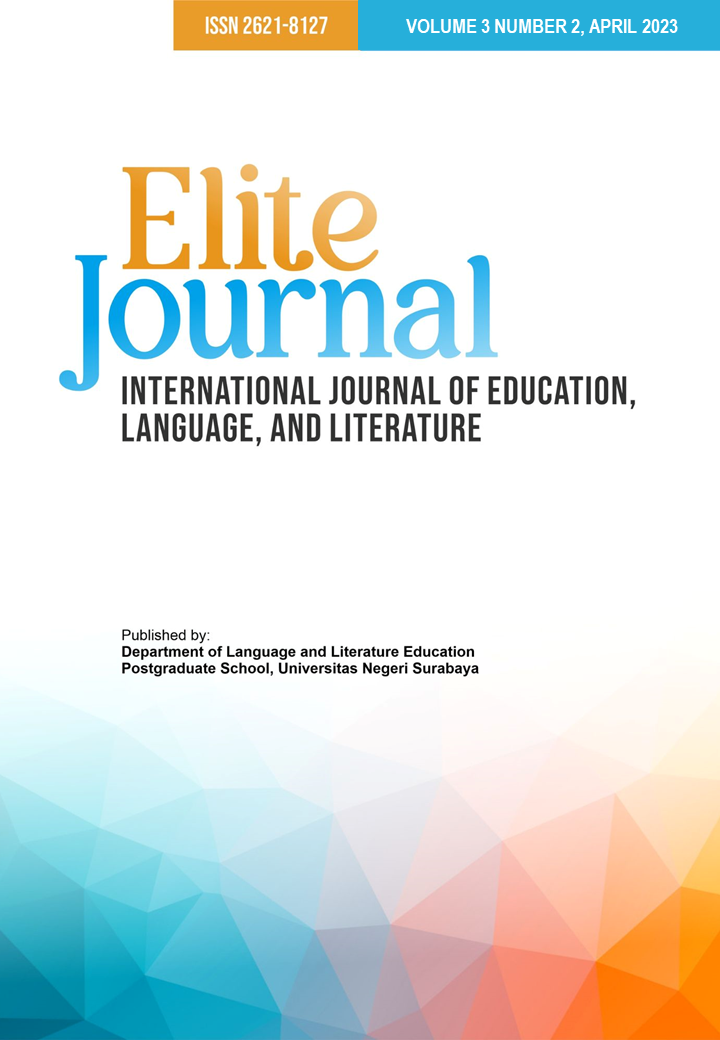THE EFFECTIVENESS OF ROLE-PLAY TO IMPROVE STUDENT'S SPEAKING ACHIEVEMENT
DOI:
https://doi.org/10.26740/elitejournal.v3n2.p122-135Keywords:
Role-play, speaking ability, effectiveness, achievementAbstract
The Role-play method is important to students’ growth in understanding real-life illustrations by pretending as someone else or some scenario. The study aimed to demonstrate whether the Role-play method affects students’ speaking achievement. The research was carried out in the SMP Raden Rahmat Wonokromo for seventh-year students in the academic year 2020/2021, which included 31 students. The data are collected using a few methods, including pre-tests and post-tests. To dissect the quantitative information, an expert used the highest and lowest scores, as well as means and standard deviations. According to the questionnaire results, the role-playing method can improve students’ speaking ability by 11.8%, while the traditional method is only 5.2%. The students are mainly shy to speak English, making them stutter or slower, but they are still enthusiastic about doing some Role-playing. There were differences between the pre-test and the post-test of about 72.5 and 84.3 in the experimental class, respectively. According to the calculation, the ttest is higher than the ttable, 4.304 > 1.697. In other words, the hypothesis alternative (Ha) has been accepted. The role-play practice could effectively show the students’ concern about their English-speaking achievements. It tends to be expressed that showing speaking using Role-play truly impacts students’ English-speaking achievement.
References
Achmad Fawaid & Ateilla Mirza. (2011). Models of Teaching (Model-Model Pengajaran). Yogyakarta: Pustaka Pelajar.
Alabsi, T. A. (2016). The Effectiveness of Role Play Strategy in Teaching Vocabulary. Theory and Practice in Language Studies, 6(2), 227. https://doi.org/10.17507/tpls.0602.02
Dhea, M. K. 2017. The Effectiveness of Role-play Technique in Teaching Speaking for EFL College Students. Journal of language Teaching and Research, Vol. 8, No. 5, pp. 863-870, from: http://dx. Doi.org/10.17507/j1tr.0805.04.
Eliawati, T. (2019, December). Penerapan Metode Pembelajaran Problem Based Learning Pada SMK Pelayaran Samudera Indonesia-Medan. In SNPMas: Seminar Nasional Pengabdian pada Masyarakat (pp. 280-287).
Kurniawan Agung. (2017). The Effect of Role Play on Students Speaking Skill at Seventh Grade of Madrasah Sanawiyah Muhammadiyah 01 Medan.
Lestari, F. (2020). an Analysis of Student Speaking Skill Using Role Play Method. PROJECT (Professional Journal of English Education), 3(1), 114, from https://doi.org/10.22460/project.v3i1.p114-119
Mawarni, Candri. (2011). The Effectiveness of Role Play Technique in Improving EB- 1.09 Students Speaking Skill. Unpublished Thesis. Politeknik Mandiri Bina Prestasi of Medan.
Nunan, D. (2015). Teaching English To Speakers: An Introduction.
Risdianto, F. (2018). Full Text Vol 11 No 2 Register Journal 2018.Pdf. 11(2), from http://journalregister.iainsalatiga.ac.id/
Solliyah, P. Sofian, Luwandi, S. The Use of Role Play in Teaching Speaking.
Suryani Lilis, (2015). The Effectiveness of Role-play in Teaching Speaking. Journal, volume 3/II.
Downloads
Published
How to Cite
Issue
Section
License
Copyright (c) 2023 Irfan Maulana, Yuri

This work is licensed under a Creative Commons Attribution 4.0 International License.
 Abstract views: 1654
,
Abstract views: 1654
, PDF Downloads: 4792
PDF Downloads: 4792





